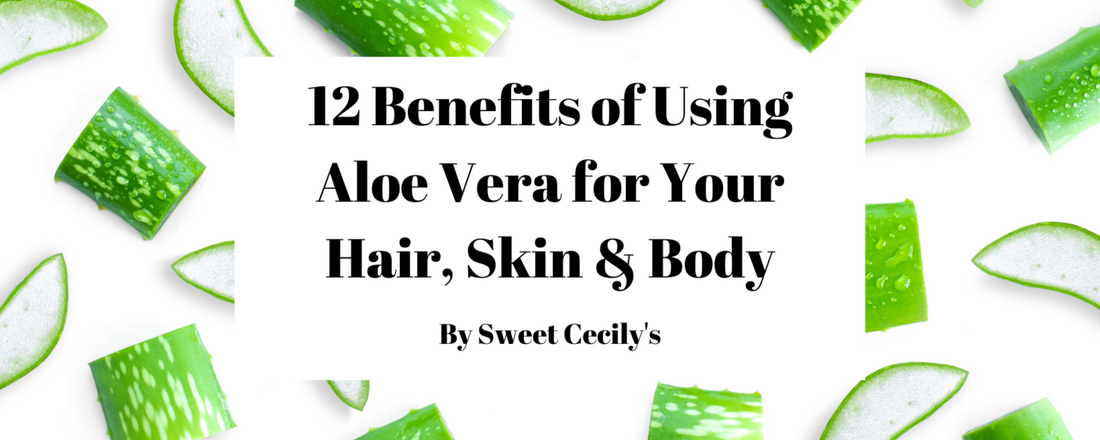
12 Benefits of Using Aloe Vera for Your Hair, Skin & Body
Share
Used for thousands of years, the Aloe Vera plant has been utilised for numerous medical reasons, with its earliest recorded use being in ancient Egypt. At that time, the ancient Egyptians described the succulent as “the plant of immortality” due to its great anti-inflammatory properties. Originally native to Southern Europe, North Africa and the Canary Islands, there are over 250 species of the plant. However, only 4 types are grown specifically for their health benefits.
Today, the succulent Aloe Vera plant is most commonly used to relieve and soothe sunburn. The gel and cream forms have become a staple item to be packed in a toiletry bag when travelling to a hot sunny country. People also pot this spikey plant to take advantage of its aesthetic looks, adding it to the décor of a house.
The plant has thick spiky leaves that store water within its slimy tissue. When the plant is cut up, the gel-like substance is exposed which is packed full of vitamins, minerals, and antioxidants. Therefore, it doesn’t come as a surprise to know that it can help all aspects of your body to thrive.
Keep reading to find out just how great the Aloe Vera plant is for your hair, skin, and body.
For Your Hair
Strengthening Your Hair –
Aloe Vera is packed full of nutrients including Vitamins A, B12 and C. All of which play an important role in keeping the hair follicles of your hair healthy. These vitamins may help to prevent your hair from falling out whilst promoting cell turnover. Leaving your hair looking shiny and feeling strong.
Hair Growth –
Some people who have used Aloe Vera in their hair have claimed that it has increased the rate at which their hair grows. Unfortunately, there has been no firm evidence to confirm these claims. However, research carried out on the plant has found that aloe Vera contains a chemical compound called Aloenin. This compound plays a big factor in promoting hair growth, especially in people who suffer from alopecia.
Reduce Greasy Hair –
Aloe Vera works well for preventing your hair from becoming too oily and greasy looking. The enzymes which are found in the plant can efficiently break down excess oil (sebum) that is produced at the scalp, reducing the oily appearance on your hair. Unlike many other hair products, aloe Vera can clean your hair without causing any damage to it.
Relieving Itchy Scalps –
People who suffer with dandruff (seborrheic dermatitis) may find using Aloe Vera on their scalp helpful. The anti-inflammatory properties that come from this plant can reduce the inflammation on the scalp and relieve the need to itch it.
For Your Skin
Sunburn -
The most common use for aloe Vera is to soothe sunburn. I’m sure many of us have spent too much time in the sun and when we head back inside, we resemble a bright red lobster. Then we start to realise how much it stings and so we head straight for the aloe Vera gel to relieve the burn. It is important to know that using this gel does not help to prevent sunburn therefore, you should use sun cream regularly to avoid it.
Moisturising The Skin –
The gel like substance is classed as a humectant which means that when applied topically to the skin, it can lock moisture in. Additionally, the high concentration of water found within the leaves of the plant helps to add hydration to the skin without leaving the skin feeling greasy.
Promotes The Healing of Wounds –
Soldiers in WW2 would use the Aloe Vera plant as a natural remedy to speed up the healing of their wounds and burns. Research into this has found that applying aloe gel to the wound can help to accelerate the process which promotes skin cell proliferation (when the damaged area is rebuilt with new cells).
Fights Skin Ageing (Free Radicals) –
The thick texture of Aloe Vera gel can be used for protection against damage from free radicals. These unstable molecules caused by exposure to the sun, air pollution and smoke contribute to your skin ageing faster. As Aloe Vera is a humectant, water is held at the surface of the skin, this acts as a layer of protection. As a result, the appearance of fine lines and wrinkles will be reduced.
Collagen Production -
As we get older, it is inevitable that we start to show our age, in particular on our hands and face. It doesn't come as a surprise that the anti-ageing skincare market has continued to increase year on year. Molecules called sterols which are found in the Aloe Vera plant can naturally promote the production of collagen and hyaluronic acid. This further helps to minimise signs that the skin is ageing as well as, helping to tighten up the skin in the process.
For Your Body
Not only can Aloe Vera be applied topically to the skin, but it can also be consumed in the form of a drink. The gel from the plant can be combined with water to make an Aloe Vera juice. When the drink is ingested, it can help to improve several internal issues.
Heartburn -
The anti-inflammatory properties of the plant help to relieve the acid reflux (heartburn). Research has found that consuming Aloe Vera in the form of a drink can reduce the acid production which is the cause behind the burning sensation.
Treats Constipation -
Certain chemical compounds in Aloe Vera make this plant suitable to be used as a laxative. Drinking aloe juice can help to gently stimulate bowel movements without causing damage to the digestive system. This may help to relieve constipation.
Conclusion -
The Aloe Vera plant can provide several great benefits when it comes to your hair, skin and body. However, it may not be suitable for everyone, if you are considering using Aloe Vera topically, you should conduct a patch test before use.

